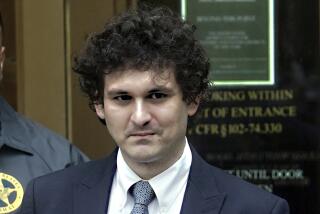NYSE Study Finds Little Fault With Program Trading
- Share via
NEW YORK — A study of computerized program trading commissioned by the New York Stock Exchange has found no new evidence that the exotic technique drives stock prices down but says it saps public confidence in the capital markets anyway.
The study, released Wednesday and prepared by former U.S. Atty. Gen. Nicholas deB. Katzenbach and associates at his New Jersey law firm, suggests that the regulation of the stock market and related futures markets in Chicago be consolidated under a single federal agency. Regulation is now divided between the Securities and Exchange Commission and the Commodity Futures Trading Commission.
Katzenbach also proposed a number of technical changes in the stock and stock futures markets--in order, he said, to make trading techniques in the interdependent markets more similar. He argued that this would restore public confidence that the markets are used more for investment than speculation.
Copy to Brady Panel
But he proposed no real restrictions on futures trading by professional investors--the “program trading” blamed by many stock investors for such sharp drops in prices as occurred during the crash of Oct. 19. Instead, Katzenbach said, the Big Board should continue to expand the capacity of its electronic systems to accommodate these professionals.
Katzenbach, who was commissioned by the NYSE last March, made no separate study of whether program trading contributes to price volatility in the stock market. SEC and CFTC studies are inconclusive but tend to suggest that there are no important long-range effects on stock prices. Katzenbach said Wednesday: “I don’t believe Chicago is responsible for the crash.”
The role of program trades in the Oct. 19 crash is being studied by a presidential commission headed by investment banker Nicholas Brady. Katzenbach said he gave the Brady panel a copy of his report and that the panel’s findings are likely to be “much more important than anything I’ve said.”
Among his proposals is that commodity exchanges should raise the “margin” that is charged futures traders. This would discourage speculation by undercapitalized traders, he argued.
These margins are good-faith deposits designed to ensure that futures buyers meet their financial obligations to sellers and vice versa. They are different from stock margins, which are down payments on loans for investors to buy stock and by law can be no less than 50% of the value of the stock being purchased. Katzenbach said futures margins need not be as high as 50% but should be higher than the 5% to 10% of the value of futures contracts currently charged.
Futures are contracts for the delivery of some commodity at a later date at a set price. But unlike most such contracts, stock index futures anticipate not the delivery of specific stocks but an exchange of cash equivalent to the underlying stocks. Katzenbach proposed requiring settlement with stocks, not cash, as one way to discourage excessive futures speculation.
He also proposed that portfolios of stocks designed to match key stock indexes, such as the Standard & Poor’s index of 500 widely held stocks, be traded as units on the NYSE floor. This would be a radical change from current practice, in which investors must buy shares of each stock separately. But Katzenbach argued that the change would give professionals a way to bet on the general direction of the stock market without resorting to futures.
More to Read
Inside the business of entertainment
The Wide Shot brings you news, analysis and insights on everything from streaming wars to production — and what it all means for the future.
You may occasionally receive promotional content from the Los Angeles Times.










